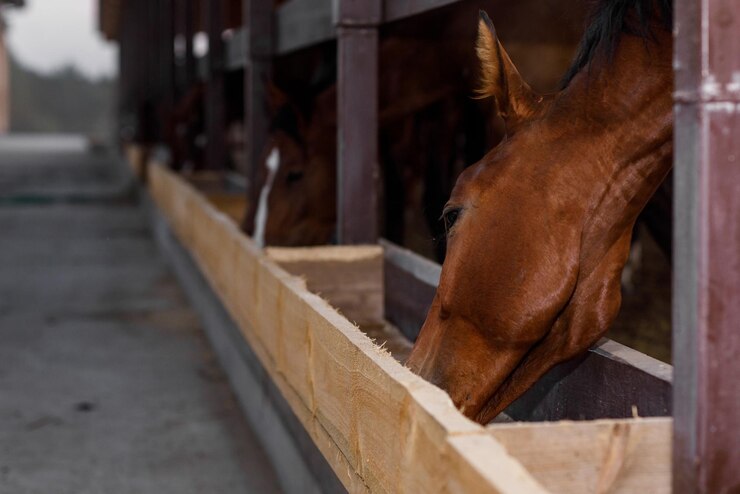In the world of equestrian care, ensuring the health and well-being of horses is paramount. One crucial aspect that demands attention is feeding overweight horses. Proper nutrition and management play a significant role in maintaining a healthy weight and preventing health issues in these majestic animals.
Overweight horses face unique challenges, and addressing their dietary needs requires careful consideration. By understanding the factors contributing to weight gain and implementing effective strategies, horse owners can help their equine companions achieve and maintain a healthy body condition.

Understanding Equine Obesity
Equine obesity is a growing concern among horse owners. Just like humans, horses can suffer from the adverse effects of excess weight, including joint stress, metabolic disorders, and reduced overall performance. Recognizing the signs of obesity and taking proactive measures is crucial in ensuring the long-term health of your horse.
Signs of an Overweight Horse
Identifying an overweight horse is the first step in addressing the issue. Key indicators include a lack of defined muscles, difficulty in feeling ribs, and a noticeable crest along the neck. Regular body condition scoring can help in assessing the weight status of your horse.
Causes of Weight Gain in Horses
Multiple factors contribute to weight gain in horses. Understanding these causes can help in formulating an effective feeding plan.
Overfeeding and Lack of Exercise
Overfeeding is a common cause of weight gain. Horses are natural grazers, and unrestricted access to high-calorie feeds can lead to obesity. Coupled with a lack of exercise, this can exacerbate the issue.
Metabolic Disorders
Certain horses are predisposed to metabolic disorders such as insulin resistance and Equine Metabolic Syndrome (EMS), which can lead to weight gain. For more insights on this, you can refer to feeding horses with metabolic issues.
Strategies for Feeding Overweight Horses
Implementing effective strategies is crucial in managing the diet of overweight horses.
Controlled Feeding
Controlling the amount and type of feed is essential. Opt for low-calorie feeds and limit grazing time to prevent excessive calorie intake.
Regular Exercise
Incorporating regular exercise is vital in managing weight. Exercise not only helps in burning calories but also improves overall fitness and well-being.
Monitoring Mineral Intake
Ensuring a balanced intake of minerals is crucial. Consider using mineral blocks to supplement essential nutrients.
Nutrition Tips for Overweight Horses
Providing the right nutrition is key to managing the weight of your horse.
Fiber-Rich Diet
A diet rich in fiber is beneficial for overweight horses. High-fiber feeds promote satiety and provide essential nutrients.
Limit Carbohydrates
Reducing the intake of non-structural carbohydrates (NSC) is crucial. High levels of NSC can contribute to weight gain and metabolic issues.
Supplements for Weight Management
Certain supplements can aid in weight management. Consider adding supplements like zinc and magnesium to support metabolic health.
Common Mistakes to Avoid
Avoiding common pitfalls in feeding overweight horses is essential in achieving desired results.
Over-Supplementation
While supplements can be beneficial, over-supplementation can lead to imbalances. It’s crucial to consult with a veterinarian to determine the right balance for your horse.
Inconsistent Feeding Schedule
Maintaining a consistent feeding schedule is important. Irregular feeding can disrupt metabolism and contribute to weight gain.
The Role of Blood Testing
Regular blood testing can provide insights into the nutritional status of your horse. It helps in identifying deficiencies or imbalances that may contribute to weight issues. For more information, consider visiting blood vitamin and mineral testing in horses.
Conclusion
Feeding overweight horses requires a balanced approach that considers their unique dietary needs. By understanding the causes of weight gain and implementing effective strategies, horse owners can promote the health and well-being of their equine companions. Remember, regular monitoring and adjustments are key to achieving and maintaining a healthy weight for your horse.

FAQ Section
How can I tell if my horse is overweight?
Look for signs such as a lack of defined muscles, difficulty in feeling ribs, and a noticeable crest along the neck. Regular body condition scoring can also help.
What type of diet is best for an overweight horse?
A diet rich in fiber and low in non-structural carbohydrates (NSC) is ideal. Consider fiber-rich feeds and limit high-calorie grains.
Is it necessary to consult a veterinarian for feeding overweight horses?
Yes, consulting a veterinarian is recommended to determine the best feeding plan and to address any underlying health issues.
This article contains affiliate links. We may earn a commission at no extra cost to you.
